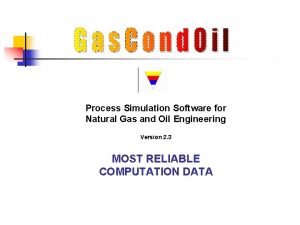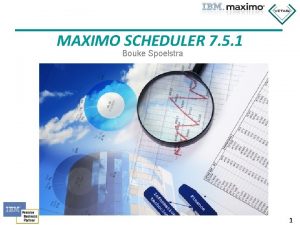Tackling corruption in the oil and gas sector








- Slides: 8

Tackling corruption in the oil and gas sector in Nigeria The experience of FOSTER Neil Mc. Culloch 13 May 2016

12 th August 2014 © 2014 Oxford Policy Management Ltd 2

The evolution of donor thinking on extractives The Traditional Approach � Poor laws => support for legal drafting � Poor regulation => support for regulatory analysis and formulation � Poor implementation => capacity building for ministries (Finance, Mines, Petroleum etc) � Poor local outcomes => encourage CSR and higher standards Ø Politics has typically been seen as a inhibitor, or a constraint that one has to work around if possible. … has often failed � Laws are drafted but never passed (or ignored in practice) � Good analysis is done, but policies aren’t introduced � Capacity in ministries remains very low – capacity is not built in a sustainable way � Some firms behave very well – but their standards do not spread to others Ø Have to understand why things are the way they are first and put politics at the centre of interventions © 2014 Oxford Policy Management Ltd 3

The Facility for Oil Sector Transparency (FOSTER) in Nigeria � DFID Transparency and Technical Assistance project in Nigeria � Total budget £ 14 m, 2011 -16 � Outcomes desired: 1. 2. 3. Increase in extractive industries revenues identified Improved management and accountability of extractive industry resources Improved policy outcomes for local communities affected by natural resource extraction © 2014 Oxford Policy Management Ltd 4

Identifying “sweet spots” of effectiveness © 2014 Oxford Policy Management Ltd 5

Key operational components of the FOSTER Model • Flexible and adaptive response model o Programs activities as it goes along drawing on a “managed fund” - funds not pre-allocated to specific interventions o simple and quick procurement processes o flexibility in who to work with o utilising a range of modalities Ø TA, grants, research etc. • Willing to embrace risk o high chance of failure but potential large pay-offs (even from small changes) o undertaking overtly political actions (but through partners, no FOSTER brand) • Locally led and politically smart o Entirely Nigerian team identify and design the interventions o Rapid approval process through service provider and DFID © 2014 Oxford Policy Management Ltd 6

Results so far • Large revenue savings for the Government of Nigeria o Proven savings of over £ 400 million for Federation of Nigeria (and possibly much more) • Raising the state of knowledge and calibre of public debate on oil and gas policy o Through reports, TV, radio, print media, infographics, blogs etc. • Agreement about what the legal framework for the sector should be o Far better understanding of the Petroleum Industry Bill … o … but it hasn’t passed yet. • Institutionalisation of transparency and accountability o Nigeria EITI regarded as one of the most effective EITI organisations © 2014 Oxford Policy Management Ltd 7

Lessons for Donor Engagement � A continual understanding of the politics is essential – It is essential to really understand the underlying incentives of the key actors in order to know what can be done and what cannot � Interventions need to be “locally led” – But this does not necessarily mean government led � Flexible and adaptive programming makes sense – Particularly in an environment where things change quickly and you don’t know whether a particular activity will be successful or not � This requires an acceptance of risk from donors – Which means intensive donor engagement without micromanagement � … and a new way of measuring impact – Attribution is extremely difficult; even assessing contribution is hard © 2014 Oxford Policy Management Ltd 8















